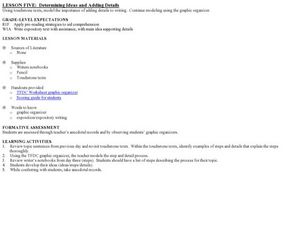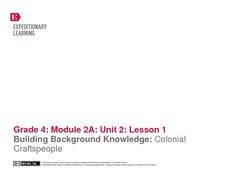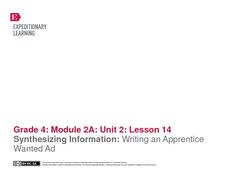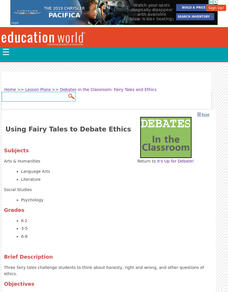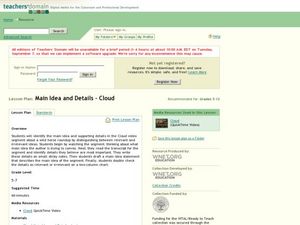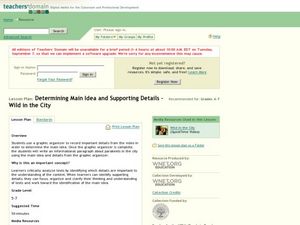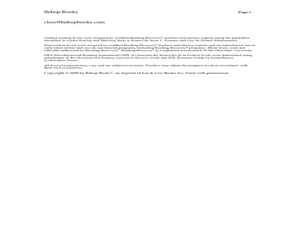Curated OER
Determining Ideas and Adding Details
A handy TFDC (topic/fact/detail/conclusion) graphic organizer (included) allows young writers to outline and record their main ideas and supporting details in the prewriting phase. They then continue to add details to the topic sentences...
Curated OER
Use Details from Text to Identify Cause and Effect, Draw Conclusions, Compare and Contrast
Third graders discuss research topics and write a paragraph on one of the provided questions. They focus on including key words from charts that the class has been compiling. They underline supporting details within the text they write....
EngageNY
Building Background Knowledge: Colonial Craftspeople
In the first lesson plan of this unit on colonial trade, fourth graders gain background knowledge of different jobs performed by early colonists. The class begins with a slide show presentation that includes a variety of great...
EngageNY
Mid-Unit Assessment: Close Reading of Bullfrog at Magnolia Circle: Bullfrog Life Cycle
The sixth lesson plan in this Bullfrog at Magnolia Circle unit assesses your third graders' ability to read and understand informational text. The included assessment asks learners to take notes about the main idea and supporting...
Curated OER
Main Idea in Informational Text
Individuals complete a pre-assessment to gauge their ability to determine the main idea and supporting details in nonfiction text. They examine a new piece of nonfiction reading by looking at the table of contents, headings, and index...
Curated OER
Pizza Biography
A biography writing lesson with a tasty twist! Kids create a "visual biography" in which each pizza slice represents a paragraph, and toppings represent supporting details. They learn research techniques, note-taking skills, and how to...
Crabtree Publishing
The Genius of the Ancients
It is said that necessity is the mother of invention. Fifth graders prove this with help from three lessons that examine how ancient cultures used their needs to drive innovations. In lesson one, pupils identify main ideas and supporting...
Curated OER
Only the Facts
Practice the strategy of summarizing to gain meaning and knowledge from an informational text. Young readers highlight supporting details and main ideas, and then they use this to summarize two articles: "The Great Quake" and "What...
Curated OER
What Was That All About?
Through direct instruction, the teacher demonstrates how to identify the main idea and supporting details of a text when creating a summary. As a class, read a paragraph, highlighting relevant information and crossing out extraneous...
Curated OER
Summarizing with James and the Giant Peach
Elementary readers in literature groups practice summarizing chapter-by-chapter with Roald Dahl's James and the Giant Peach. Focus on main idea, supporting details, and the 5 Ws. Unfortunately, a clever "peach" graphic organizer to which...
EngageNY
Continued Close Reading of Bullfrog at Magnolia Circle: Text-Dependent Questions and Vivid Words and Phrases
As 3rd graders continue reading Bullfrog at Magnolia Circle, they focus on the concepts of predator and prey in the fifth lesson plan of this unit. Scholars further develop their ability to answer questions using evidence from the text...
EngageNY
Continued Close Reading of Bullfrog at Magnolia Circle: Text-Dependent Questions and Vivid Words and Phrases
In the third activity from this unit based on the book Bullfrog at Magnolia Circle, learners focus on using specific details from the text-to-answer questions about the habitat of bullfrogs. While reading the text, young...
EngageNY
Close Reading of Bullfrog at Magnolia Circle: Main Ideas about the Bullfrog
As your class reaches the end of the book Bullfrog at Magnolia Circle, the seventh lesson in this literary unit helps third graders transition from reading narrative to expository writing. Scholars develop their note-taking skills...
EngageNY
Synthesizing Information: Writing an Apprentice Wanted Ad
Fourth graders view examples of help-wanted ads as they plan and create their own writing in the fourteenth instructional activity of this unit on colonial trade. The engagement of the class is captured when the teacher shares an actual...
Curated OER
Main Idea and Supporting Details on Pitcher Plants
Third graders read, Fly Traps! Plants that Bite Back. They locate the main idea and supporting details in the pitcher plants section. Then after they have located the information as individuals have them write it down in their reader's...
Curated OER
Animals in the Media
Sure to activate young minds, this resource asks learners to consider how media influences their personal points of view. Pupils examine how animals are portrayed in the media to understand why they feel the way they do about those...
Curated OER
Using Fairy Tales to Debate Ethics
Is trickery ever justified? Is it okay to steal from someone who has stolen from you? Puss, from Puss in Boots, and Jack, from Jack and the Beanstalk, might have some ideas about these ethical questions. After listening to a series of...
Media Smarts
Broadcasting Codes
Let your learners be the judges for a series of case studies that focus on broadcast codes in Canada. In order to familiarize your class with the codes and guidelines that govern the broadcasting industry, in particular Canada's...
Curated OER
Using Details From The Text
Begin this expository writing activity by reading a non-fiction book of your choice and modeling expository writing. The plan suggests The Trip of a Drip by Vicki Cobb but notes that other texts will work. Learners then choose a...
Curated OER
Main Idea and Details-Cloud
Students distinguish between main idea and details. In this writing process lesson plan, students use a video on horses to learn about note-taking. They write details from the video on sticky notes, and then determine which...
Curated OER
Determining Main Idea and Supporting Details-Wild in the City
Students discuss the main idea of a story. In this writing process lesson, students use a video about parakeets as a tool to find the main idea of a story. After viewing the video, they engage in a discussion about...
Curated OER
Is That a Fact?
Investigate popular scientific claims and gather evidence to defend or argue against an author's stance. Writers synthesize information and compose their own "Really?" columns modeled after those found in the weekly "Science Times"...
Curated OER
What Do You See at the Pond?
With What Do You See at the Pond?, young readers explore pond life and practice reading strategies. Learners first make predictions and then read the simple story independently. After a second read-through with a partner, kids come...
Curated OER
Liberty and Security in Contemporary China
Upper graders consider contemporary Chinese economics, political viewpoints, and government. This unit covers a span of several class periods or six days, and engages learners in a variety of skills based activities. They conduct...
Other popular searches
- Main Idea Supporting Details
- Main Idea & Supporting Details
- Identifying Supporting Details
- Finding Supporting Details
- Writing Supporting Details
- Main Ideas Supporting Details
- Main Ideas. Supporting Details
- Main Idea/supporting Details
- Paragraph Supporting Details
- Details and Supporting Ideas
- Supporting Details Worksheets
- Main Idea, Supporting Details
